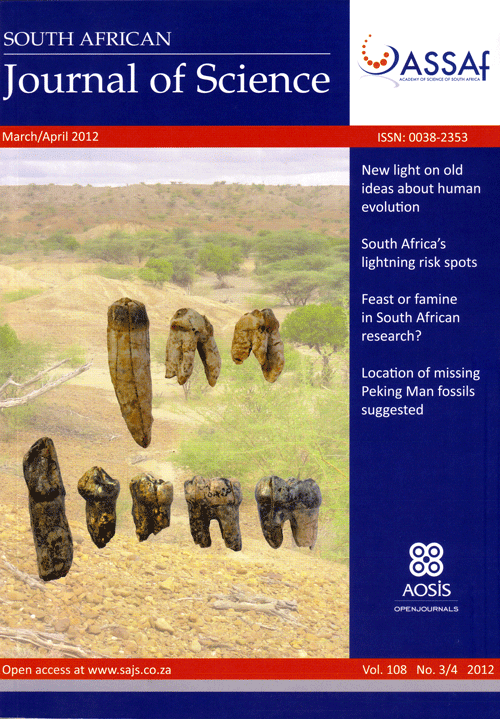A theoretical model for substance abuse in the presence of treatment
Keywords:
core group model, backward bifurcation, relapse, treatment, stability, simulationsAbstract
The production and use of addictive stimulants has been a major problem in South Africa. Although research has shown increased demand for drug abuse treatment, the actual size of the drug-abusing population remains unknown. Thus the prevalence of drug abuse requires estimation through available tools. Many questions remain unanswered with regard to interventions, new cases of substance abuse and relapse in recovering persons. A six-state compartmental model including a core and non-core group, with fast and slow progression to addiction, was formulated with the aim of qualitatively investigating the dynamics of substance abuse and predicting drug abuse trends. The analysis of the model was presented in terms of the substance abuse epidemic threshold R0. Numerical simulations were performed to fit the model to available data for methamphetamine use in the Western Cape and to determine the role played by some key parameters. The model was also fitted to data on methamphetamine users who enter rehabilitation using the least squares curve fitting method. It was shown that the model exhibits a backward bifurcation where a stable drug-free equilibrium coexists with a stable drug-persistent equilibrium for a certain defined range of values of R0. The stabilities of the model equilibria were ascertained and persistence conditions established. It was found that it is not sufficient to reduce R0 below unit to control the substance abuse epidemic. The reproduction number should be brought below a determined threshold, R0c. The results also suggested that the substance abuse epidemic can be reduced by intervention programmes targeted at light drug users and by increasing the uptake rate into treatment for those addicted. Projected trends showed a steady decline in the prevalence of methamphetamine abuse until 2015.Downloads
Published
2012-03-16
Issue
Section
Research Articles
License

All articles are published under a Creative Commons Attribution 4.0 International Licence
Copyright is retained by the authors. Readers are welcome to reproduce, share and adapt the content without permission provided the source is attributed.
Disclaimer: The publisher and editors accept no responsibility for statements made by the authors
How to Cite
Saidi Kalula, A., & Nyabadza, F. (2012). A theoretical model for substance abuse in the presence of treatment. South African Journal of Science, 108(3/4), 12 pages. https://sajs.co.za/article/view/9894
Views
- Abstract 246
- PDF (859 KB) 148
- HTML 245
- EPUB 91
- XML 79
- Eqn yy 0
- Figure 1 0
- Figure 2 0
- Figure 3 0
- Figure 4 0
- Figure 5 0
- Figure 6 0
- Figure 7 0
- Figure 8 0
- Figure 9 0
- Table 1 0
- Table 2 0
- Table 3 0
- Table 4 0
- Eqn 1 0
- Eqn 2 0
- Eqn 3 0
- Eqn 4 0
- Eqn 5 0
- Eqn 6 1
- Eqn 7 0
- Eqn 8 0
- Eqn 9 0
- Eqn 10 0
- Eqn 11 0
- Eqn a 0
- Eqn b 0
- Eqn c 0
- Eqn d 0
- Eqn e 0
- Eqn f 0
- Eqn g 0
- Eqn h 0
- Eqn i 0
- Eqn j 0
- Eqn k 0
- Eqn l 0
- Eqn m 0
- Eqn n 0
- Eqn o 0
- Eqn p 0
- Eqn q 0
- Eqn r 0
- Eqn s 0
- Eqn t 0
- Eqn u 0
- Eqn v 0
- Eqn w 0
- Eqn x 0
- Eqn y 1
- Eqn z 0
- Eqn aa 0
- Eqn bb 0
- Eqn cc 0
- Eqn dd 0
- Eqn ee 1
- Eqn ff 0
- Eqn gg 0
- Eqn hh 0
- Eqn ii 0
- Eqn jj 0
- Eqn kk 0
- Eqn ll 0
- Eqn mm 0
- Eqn nn 0
- Eqn oo 0
- Eqn pp 0
- Eqn qq 0
- Eqn rr 0
- Eqn ss 0
- Eqn tt 0
- Eqn uu 0
- Eqn vv 1
- Eqn ww 0
- Eqn xx 0
- Eqn zz 0
- Eqn aaa 0












.png)